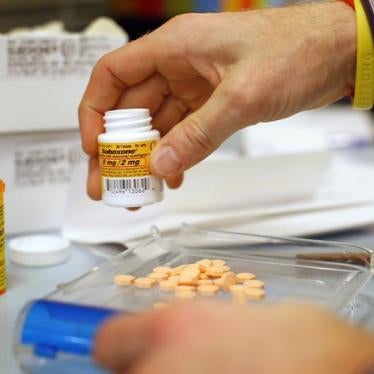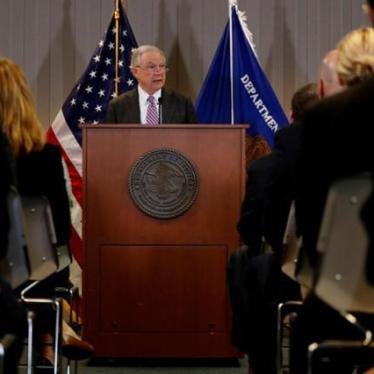Last week, U.S. Attorney General Jeff Sessions instructed U.S. attorneys to seek the death penalty for drug dealers in all “appropriate” cases. This flies in the face of a decade of bipartisan work in Congress to address the harm caused by drug addiction, and threatens to make federal drug enforcement efforts even more pointlessly cruel than they already are.
Sessions has spent his first year as attorney general trying to turn back time by repealing significant Obama-era criminal justice reforms. He has moved to limit federal oversight of local law enforcement that was designed to reduce abuses and to encourage prosecutors to charge the most serious offenses possible.
The overdose crisis requires urgent action, but more harsh prosecutions won’t help. Instead of calling for the death penalty, the Trump administration should focus on supporting and implementing proven public health strategies that will save lives, not take them. The Trump planrelies on 20th century attempts to address the overdose problem, invoking concerns of more over-policing in communities of color, greater disproportionate sentencing, and harmful criminalization of drug possession for personal use.
The Centers for Disease Control and Prevention has estimated more than 66,000 died from a drug overdose in 2017. The United States can’t afford to waste its time on tough-on-crime posturing and, instead, needs to focus on measures that have been shown to work. And extensive research has shown that the death penalty does not deter crime.
The death penalty is inhumane, not least because it is inherently irreversible. Most U.S. experts and state governments have recognized that its application has been plagued with arbitrariness, racial disparities and error. The number of executions in the United States, in fact, has dropped to its lowest in 25 years, with fewer death sentences imposed last year than in any year since 1973.
People convicted of drug-related offenses in the United States already suffer massively disproportionate punishment — something President Trump and Attorney General Sessions seem not to appreciate as problematic. Disturbingly, Trump repeatedly has praised the Philippines’ war on drug users, a murderous government-sanctioned campaign that has resulted in more than 12,000 extrajudicial killings in the past two years. Only a few countries, Iran and Saudi Arabia among them, still impose the death penalty for drug crimes.
The U.S. government and many states had been moving in a more positive and forward-looking direction in recent years, adopting measures that have been shown to work on reducing the harm caused by drug use. Congress has passed a series of bipartisan criminal justice law reforms. The Second Chance Act of 2007 improved programming for prisoners’ re-entry into the community. The Fair Sentencing Act of 2010 reduced the sentencing disparity for the use of crack and powder cocaine, which had imposed disproportionately longer sentences on crack offenders and caused egregious racial disparities in the federal system.
The Comprehensive Addiction and Recovery Act of 2016 improved access to drug treatment and to naloxone, the opioid overdose antidote that has saved tens of thousands of lives. In 2016, Congress also modified the law to make front-line public health and harm reduction services such as syringe exchanges eligible to use federal HIV/hepatitis C prevention dollars.
And in February, the Senate Judiciary Committee, under Chairman Chuck Grassley’s leadership, reported the Sentencing Reform and Corrections Act, S. 1917 (SRCA), out of committee. The SRCA bill seeks to rein in federal mandatory minimum sentencing laws by increasing judicial discretion in sentencing and reducing some mandatory minimums for drug offenses, while also expanding prison reentry programs for eligible prisoners to qualify for early release.
The massive loss of life in the United States as a result of drug dependence requires a dramatic response. But instead of looking at solutions that have been shown to help, the Trump administration has chosen a response that is cruel and full of dangerously mindless drama — the kind that will make the crisis worse and kill more people in the process.








